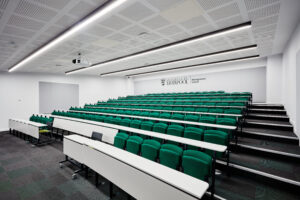How you'll learn
Our Digital Marketing and Analytics MSc is delivered via online material, lectures, tutorials, practical tasks, interactive activities, case studies and project work.
Lectures will provide you the main of concepts, principles and theories around data-driven marketing.
You will then apply what you have learned during the lectures in practical sessions focused on real-life case studies, involving group or individual work.
Following semester two, you will complete a dissertation with the support of an academic supervisor.
This final project will deepen your knowledge, understanding and capabilities by undertaking research in a distinct area of data-driven marketing.
Teaching time accounts for an average of 10 hours per week. However, you should anticipate an additional 24 hours of self-directed study and group work per week.
How you're assessed
To achieve your MSc qualification, you need to complete 180 credits:
- Semester One: three 20-credit modules (60 credits in total)
- Semester Two: three 20-credit modules (60 credits in total)
- Final project: 60 credits.
You must pass all the modules with a minimum grade of 50%. Subject to meeting specific criteria outlined by the University, you will graduate with a Pass, Merit or Distinction.
Assessment tasks are varied, and some may be explicitly designed to meet the learning outcomes of a particular programme of study.
You can expect to be assessed via coursework, essay, group work, (video) presentations, case studies, infographics, reports and examinations.
The weighting of individual assessment components varies across modules. You will find detailed information of this in the module specification.
Liverpool Hallmarks
We have a distinctive approach to education, the Liverpool Curriculum Framework, which focuses on research-connected teaching, active learning, and authentic assessment to ensure our students graduate as digitally fluent and confident global citizens.
The Liverpool Curriculum framework sets out our distinctive approach to education. Our teaching staff support our students to develop academic knowledge, skills, and understanding alongside our graduate attributes:
- Digital fluency
- Confidence
- Global citizenship
Our curriculum is characterised by the three Liverpool Hallmarks:
- Research-connected teaching
- Active learning
- Authentic assessment
All this is underpinned by our core value of inclusivity and commitment to providing a curriculum that is accessible to all students.











